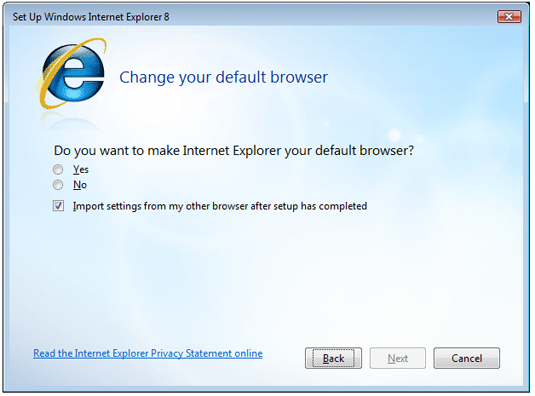 Erick Schonfeld of TechCrunch has noticed that StatCounter’s browser market share data shows Internet Explorer usage in surprisingly sharp decline. According to StatCounter, IE has lost 11.4 percentage points to Firefox and other browsers in the U.S. since March, leaving it with 54.4 percent of the market. If IE loses another half a point of share, the combined forces of all other browsers–which I like to think of as a virtual Microsoft rival called Anything But Internet Explorer–will exceed IE’s market share. And it’ll be the first time in eons that Microsoft’s browser isn’t used by the majority of Web users. It’s a remarkable reversal of fortune for a product that was once used by nine out of ten people on the Internet.
Erick Schonfeld of TechCrunch has noticed that StatCounter’s browser market share data shows Internet Explorer usage in surprisingly sharp decline. According to StatCounter, IE has lost 11.4 percentage points to Firefox and other browsers in the U.S. since March, leaving it with 54.4 percent of the market. If IE loses another half a point of share, the combined forces of all other browsers–which I like to think of as a virtual Microsoft rival called Anything But Internet Explorer–will exceed IE’s market share. And it’ll be the first time in eons that Microsoft’s browser isn’t used by the majority of Web users. It’s a remarkable reversal of fortune for a product that was once used by nine out of ten people on the Internet.
Like ZDNet’s Larry Dignan, I’m skeptical about the idea of IE’s usage swooning as strikingly as StatCounter is showing until we get more data from other sources. Still, there’s no question that IE faces fierce competition, and I haven’t seen any market share numbers that show it to be in anything but a period of decline. Every day, fewer people are using IE and more people are choosing something else.
For a very long time, the biggest competition for any new version of Internet Explorer has been…earlier versions of Internet Explorer. Much of Microsoft’s marketing for IE 8 seems to target IE 7 and IE 7 users, such as this list of the top eight reasons to download the browser. But it also addresses people who are at least thinking of using another browser in items such as this comparison of IE 8, Firefox 3.0, and Chrome 2.0. Which, incidentally, maintains that the three browsers are equally customizable–I’d be stunned if there’s anyone outside of Redmond who agrees with that.
If Microsoft merely prevents IE 6 and IE 7 users from jumping to another browser, the browser’s market share will stabilize. (At least among Windows users–if Apple continues to chip away at Windows’ dominance, IE’s overall share will continue to shrink.) But I assume that Microsoft would prefer to not only stop the bleeding but to get IE growing again. The only way that’ll happen is if users of other Windows browsers–Chrome, Firefox, Opera, and Safari–switch to IE in measurable quantities.
What are the chances of that happening? Slim, I think. For Windows users, running anything other than IE represents a conscious decision to use a browser other than the default one their OS came with. Typical users of Chrome, Firefox, Opera, and Safari-for-Windows users all seem to be dedicated fans of their browser of choice. And once you’ve found a browser you’re comfortable with, the incentive to stick with it is high. For all these reasons, any version of IE is going to need to be strikingly different and better to lure expatriates back.
As a wholly unscientific experiment, I asked my Twitter followers if any of them had abandoned another browser to use IE 8. As I write, 26 people have responded. Only two of them had dropped something else to run IE 8.
Is anyone out there a “new” IE user? What do you think it would take for Microsoft to get its browser’s market share creeping upwards again?
 Opera hates European Windows 7.
Opera hates European Windows 7.

 Firefox is the happy result of untold hours of unpaid effort by the Mozilla community. But Mozilla is
Firefox is the happy result of untold hours of unpaid effort by the Mozilla community. But Mozilla is  TechCrunch’s MG Siegler has a good post up about the
TechCrunch’s MG Siegler has a good post up about the  Microsoft is rolling out version 3 of
Microsoft is rolling out version 3 of  Erick Schonfeld of TechCrunch has noticed that
Erick Schonfeld of TechCrunch has noticed that  The Wall Street Journal is reporting that Microsoft has
The Wall Street Journal is reporting that Microsoft has